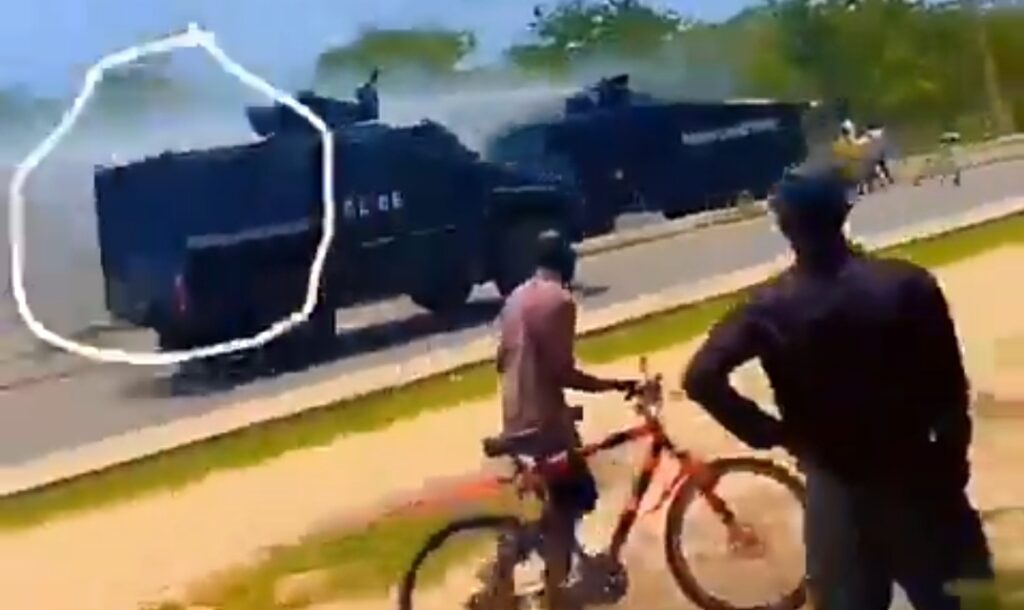
A policeman whose name has yet to be ascertained has allegedly killed one of his colleagues while shooting at peaceful protesters in Katsina State, North-West Nigeria.
A viral video showed the deceased officer in his uniform lying in a pool of blood after being allegedly shot by his colleague.
“In the peak of unprofessionalism, a careless policeman killed his colleague and harm civilians in Katsina,” an X user, A.O. Yusuf wrote, while sharing the video.
Commenting on it, another user, Salako said, “This is a very sad & unfortunate watch. It is also evident that the Nigerian Police Force are the cascading indices of violence in the ongoing protests.
“If this video evidence didn’t exist, Ben Hundeyin & Muyiwa would have blamed it on protesters.
“A national squad of clowns.”
ASP Sadiq Aliyu, spokesperson for the Katsina State Police Command did not respond to a request for comment.
Millions of Nigerians took to the streets on Thursday to protest the prevailing hunger and abuse of power in the country. At least 13 people were shot dead by police across the country on the first day, according to Amnesty International.
Demonstrations continue on Friday morning in Lagos, Ogun, Abuja, Oyo, Ogun and Rivers
Meanwhile, Kayode Egbetokun, the Inspector-General of Police (IGP), earlier lamented that police officers were killed and injured during the #EndBadGovernance protest on Thursday.
“In light of the current situation, the Nigeria Police Force has placed all units on red alert. Our officers are fully mobilised and prepared to respond swiftly and decisively to public safety and order,” Egbetokun said.
“Police stations have been destroyed. There have been attempts to take over government houses. In places like FCT, Kaduna, Kano and Gombe, among others, we recorded incidents of unprovoked attacks on our security personnel where one policeman has been reported murdered and others seriously injured,” the police boss added.
The Katsina state government had also imposed a 24-hour curfew in Dutsinma LGA via a statement issued on Friday, by Abdullahi Garba-Faskar, secretary to the state government.
The statement also banned unusual gatherings and all types of protests across the state.
“The acting governor had earlier received a group of civil society organizations who were on a peaceful demonstration at the government house and pledged to deliver their messages to the appropriate authority,” the statement reads.
“However, later government received reports that some miscreants had hijacked the protest and unleashed their ulterior motives of shop breaking, looting and vandalisation of public and private properties.
“Therefore, the government found it necessary to impose these measures to safeguard people’s lives and properties in the state.”
Abubakar Sadiq-Aliyu, spokesperson of the state police command, said, “We wish to dismiss the misinformation that police personnel shot live ammo at protesters, resulting in loss of lives,” he said.
“We assure the members of the public that our officers exercised the maximum level of restraint and professionalism in handling the violent protesters.”
Nigeria is facing its worst economic crisis in decades, with skyrocketing inflation, a national currency in free-fall and millions of people struggling to buy food. Only two years ago Africa’s biggest economy, Nigeria is projected to drop to fourth place this year.
The pain is widespread. Unions strike to protest salaries of around $20 a month. People die in stampedes, desperate for free sacks of rice. Hospitals are overrun with women wracked by spasms from calcium deficiencies.
Although President Bola Tinubu increased the minimum wage — after strike action and months-long negotiations with labour unions — from N30,000 to N70,000, his government has increased spending for officials at a time of nationwide starvation.
For workers earning the new N70,000, or $43, per month minimum wage, capricious inflation and naira value have inflicted too much damage for the changes to make any difference in their lives.
The crisis is largely believed to be rooted in two major changes implemented by Mr Tinubu, elected 14 months ago: the partial removal of fuel subsidies and the floating of the currency, which together have caused major price rises.
A nation of entrepreneurs, Nigeria’s more than 200 million citizens are skilled at managing in tough circumstances, without the services states usually provide. They generate their own electricity and source their own water. They take up arms and defend their communities when the armed forces cannot. They negotiate with armed kidnappers when family members are abducted.
But right now, their resourcefulness is being stretched to the limit.
KOIKI Media bringing the world 🌎 closer to your door step
